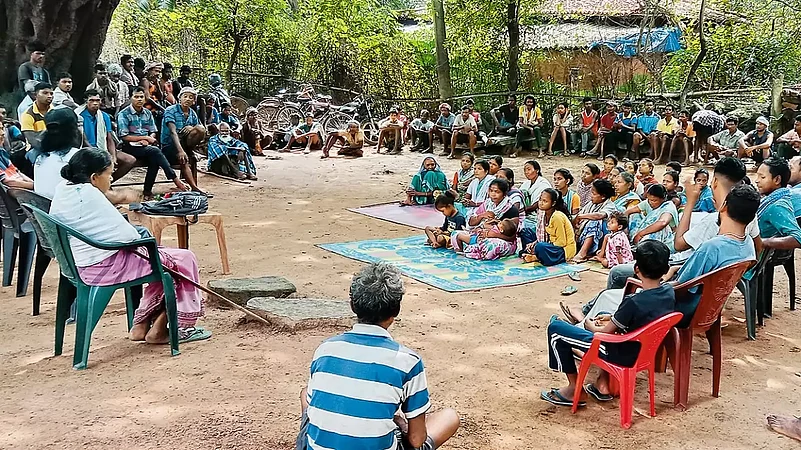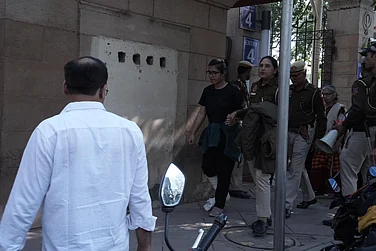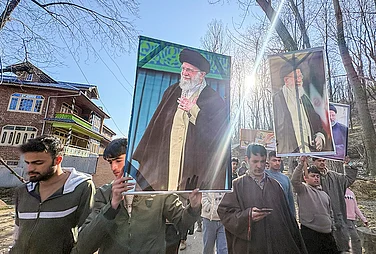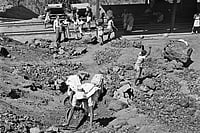There is a complete silence in Udburu village these days. Located on the Khunti–Tata road in Khunti district of Jharkhand, the sleepy tribal village wears a desolate look as most of its men have deserted it. The village was the hotbed of tribal resistance, which came to be known as the Pathalgadi movement the tribals of the state had launched in 2018 to reclaim collective rights over their land, territories and resources as enshrined in the Fifth Schedule of the Constitution.
They are in perpetual fear of the mid-night knock on their doors by the Jharkhand Police, which declared 3,210 Munda tribals of Khunti, West Singhbhum and Saraikela-Kharsawan districts absconders. Though Chief Minister Hemant Soren, after assuming office in 2019, had declared that his government would withdraw cases against Pathalgadi rebels, it has not yet withdrawn all 30 cases, 21 of which are registered under the draconian sedition law.
For instance, 41-year-old Pawal Tuti of Gutwa village in Khunti was arrested by the police on June 24, 2018. The Jharkhand High Court released him on bail in February 2020 after he had spent 20 months behind bars. He was happy when he heard the government would withdraw all cases against them. However, the respite proved short-lived and the police rearrested him one-and-half-years later on August 20, 2022.
The Pathalgadi movement began in March 2017 at Bhandra village of Khunti district when the then BJP-led Jharkhand government made land acquisition easy through two ordinances for amending the land laws—Chhotanagpur Tenancy Act, 1908 (CNT Act) and Santhal Pargana Tenancy Act, 1949 (SPT Act)—in May 2016. The state government passed the amendments to the CNT and SPT acts on November 23, 2016 in the state Assembly within three minutes without any discussion, after the ordinances lapsed, despite a huge uproar in the Assembly. These amendments would infringe upon and weaken both laws which safeguard the Adivasis’ rights over their land.
The amendments effected in Sections 21, 49 and 71 of the CNT Act and Section 13 of the SPT Act throw open Adivasi land for commercial use and their agricultural land to acquisition for non-agricultural purposes and prohibit land transfer through compensation. The first two amendments would obviously adversely affect the Adivasis, because the Jharkhand government lost no time in enlisting 2.1 million acres of the so-called government land bank, including the sacred groves, village paths, playgrounds, graveyards, forest land and hills, among others. The state government also organised a Global Investors Summit in February 2017 at Khelgaon (Ranchi), and signed 210 Memorandums of Understanding with corporate houses, which proposed to invest Rs 3.10 lakh crore in the state.
These events triggered the Pathalgadi movement and stone plaques, painted green and white measuring about 9 ft by 3 ft, were erected in more than 200 villages declaring the supreme authority of the traditional Gram Sabhas (village councils) over their land and resources. Drawing on their custom, the message had excerpts from the Indian Constitution and Supreme Court rulings, while warning ‘outsiders’ not to enter their villages without the permission of the village headman concerned, as they could no longer move freely, settle down and do business or work in the Fifth Schedule areas. The movement sought to replace the authority of both the Central and the state governments with that of the village councils.
Retribution came thick and fast as the state machinery went hammer and tongs after the agitating Adivasis. According to reports submitted to the Department of Home, Jail and Disaster Management in February 2020 by the deputy commissioners of Khunti, Saraikela-Kharsawan and West Singhbhum, the Jharkhand Police lodged 30 cases against 11,321 villagers, naming only 381 in the FIRs, while the rest were unnamed. Of the 30 cases, 21 carried sedition charges filed under Section 124A of the Indian Penal Code, for waging war against the Indian state for establishing their traditional village councils as the supreme authority. The police charge-sheeted 182 Adivasis in 30 cases and 115 of them were imprisoned in different jails. Amit Kumar, a human rights lawyer dealing with the cases of police torture in the Jharkhand High Court, says, “Police use these kinds of cases to terrorise the people.”
Prabhu Sahay Purty, alias Genda Munda, one of the prominent leaders of the Pathalgadi movement, bore the brunt of the brutal police action. The police registered four cases against 55-year-old Purty, charged him with sedition and arrested him in September 2018. After court battles for two years, he was finally released in July 2021.
Under his stewardship, Udburu gradually became the headquarters of the Pathalgadi movement. The village went on to open a bank and the first Adivasi school, after boycotting the government school. The process of building an Adivasi hospital was also started before the movement was crushed by the government after it declared the movement unconstitutional, seditious and anti-government. Now, ‘outsiders’ ply their trade freely in villages, as earlier, and no one is asked to seek permission from the village headman.
However, Purty’s freedom entailed a heavy financial cost. On reaching home, he found himself caught in the ‘debt trap’. His family members had paid over Rs 1.50 lakh to the lawyer for his bail. They had to mortgage half of 5 acres of agricultural land they owned for Rs 60,000, took a loan of Rs 18,000 from neighbours, even as relatives chipped in with Rs 53,000. The rest of the fees came from the proceeds of forest produces. Purty has two daughters, the elder one studying in inter college and younger one in high school. He is finding it difficult to pay their fees. Like Purty, his comrade-in-arm Tuti’s family is also facing financial crisis. They had to shell out Rs 1.56 lakh to the lawyer to secure his bail and for that they had to mortgage their agricultural land for Rs 60,000 and withdraw all their savings of Rs 55,000. Besides, a relative loaned them Rs 3,000 and the Shanti Sabha (Peace Committee) contributed Rs 38,000. With his rearrest, the crisis would only worsen for his family. Such cases abound throughout the villages.
The Pathalgari movement was one of the major issues in the run up to assembly elections in 2019. The opposition alliance led by Soren made a strong poll pitch against the sedition charges against more than 11,000 Adivasis. Soren promised to drop all the cases if the alliance rode to power. But even after two years his poll promise has been fulfilled only partially. Out of 30 cases, the government has withdrawn 23 cases including 16 related to sedition, and in one case only Section 124a (sedition) was withdrawn.
The worst part is that after the government declared it would withdraw all cases, most of the accused in the cases, like Pawal, took it for granted that no further action will be taken against them. So, they stopped paying attention to court cases pending against them. With Soren going back on his promise, police continue to haunt them as Tuti found one day. Purty says, “I was happy when I read about the cabinet decision to withdraw all cases. But it has proved only a fond hope. If a tribal chief minister can’t do it, who should we believe?”
Despite the police repression and the debt trap, Purty is still actively engaged in the fight for protection of Adivasis’ land, territory and resources.
(This appeared in the print edition as "A Broken Promise")
(Views expressed are personal)
Gladson Dungdung is a Ranchi-based Adivasi activist, researcher and author of two dozen books.

























